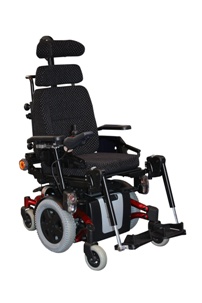Your child faces many obstacles because of cerebral palsy. As a parent, you want to consider every available device to help your child overcome each obstacle. That way, your son or daughter can have as many choices and opportunities as possible.
Adaptive Equipment Can Help
Depending on your child’s unique needs, you might consider the following types of equipment:
 Adaptive beds. Adaptive beds can keep your child from falling out of bed, make it easier to get in and out of bed, and reduce pressure sores.
Adaptive beds. Adaptive beds can keep your child from falling out of bed, make it easier to get in and out of bed, and reduce pressure sores.- Adaptive car seats. Your child may need a specialized car seat to ride safely in the car.
- Bath or shower chair. If your child can’t sit up independently, a bath or shower chair can help you bathe your child safely.
- Braces. Braces for the torso, arms, legs, or neck can help keep your child’s body properly aligned.
- Communication board. If verbal communication is difficult for your child, a communication board can allow him to communicate with his family, teachers, friends, and others.
- Gait trainer. A gait trainer is a piece of adaptive equipment that helps your child practice walking.
- Modular chairs. Modular chairs are not mobile like wheelchairs, but they are often built to be the same height as other chairs and can allow your child to participate in activities more fully.
- Therapeutic crawling device. Crawling is often delayed in children with cerebral palsy, and crawling can be an important skill for motor development. For some children, a therapeutic crawling device can help them develop this important skill.
- Toilet systems. Your child may be able to use the toilet but may have difficulty sitting up independently. A toilet system may help with his toileting independence.
- Universal cuff. A universal cuff can be put on anything your child needs to grasp, such as a spoon or a pencil, to make it easier for your child to use things independently.
- Walker. Your child may be able to walk with the assistance of a walker.
- Wheelchair. If your child can’t walk, or can’t walk long distances, a wheelchair may be essential as soon as your child outgrows a stroller.
Your child’s doctor, physical therapist, occupational therapist, speech and language pathologist, teacher, or another service provider can help you determine which of these pieces of equipment—or other adaptive devices—could benefit your child.
Often, adaptive equipment is used during physical therapy, occupational therapy, or speech and language therapy, but many devices may also be used outside of therapy if you know how to use them safely.
Paying for Adaptive Equipment and Training
Medical negligence caused your child’s cerebral palsy and, as a result, financial stress on your family. It can be overwhelming and frustrating to find a promising piece of adaptive equipment that could really help your child but discover that it is financially out of reach for you.
You shouldn’t have to worry about the cost of adaptive equipment if someone else’s negligence caused your child’s cerebral palsy. Instead, the reasonable cost of any piece of adaptive equipment that could help your child should be included in the compensation you receive from the doctor or hospital that caused his CP. Training for you and your child to use the equipment should also be included in your recovery.
Our experienced Kentucky cerebral palsy attorneys will fight for your child’s full and fair recovery of past and future adaptive equipment, medical costs, rehabilitation therapies, lost income, out-of-pocket expenses, physical pain and emotional suffering, and other damages.
Kentucky law limits the time you have to file a lawsuit to one year from the time you discovered or should have discovered your child’s cerebral palsy. Accordingly, you must act quickly to protect your child’s future.
Take the first step in protecting your child’s rights today by contacting the experienced birth injury lawyers at Gray and White Law for a free consultation. We can be reached through this website or by phone at any time.
Related Links: